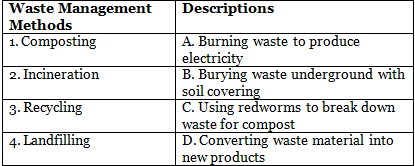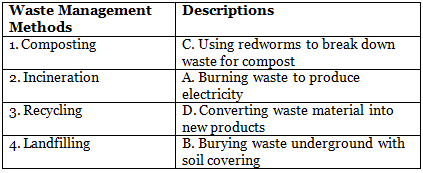Garbage In, Garbage Out Class 6 Worksheet Science
Q1: Multiple Choice Questions (MCQs)
1. What is biodegradable waste?
(a) Waste that does not decompose
(b) Waste decomposed by soil microorganisms
(c) Waste that accumulates for a long time
Ans: (b)
Biodegradable waste naturally decomposes over time with the help of soil microorganisms.
2. Which of the following is a non-biodegradable material?
(a) Vegetable waste
(b) Glass
(c) Dry leaves
Ans: (b) Glass
Glass is a non-biodegradable material as it does not decompose naturally.
3. What is the primary aim of the Swachh Bharat Abhiyan?
(a) To increase pollution
(b) To make India a clean nation
(c) To promote littering
Ans: (b)
Swachh Bharat Abhiyan is a government initiative to make India clean through people's participation.
4. How is compost formed from household waste?
(a) Burning waste
(b) Burying waste underground
(c) Natural decomposition process
Ans: (c)
Compost is formed when plant and animal waste decompose through a natural process.
5. What is the purpose of segregating household waste?
(a) To increase waste
(b) To decrease recycling
(c) To make recycling more efficient
Ans: (c)
Segregating household waste helps in efficient recycling by separating recyclable and non-recyclable materials.
Q2: Fill in the Blanks
(i) _________ waste is decomposed by soil organisms and becomes part of the soil.
Ans: Biodegradable
Biodegradable waste decomposes with the help of soil microorganisms.
(ii) What are the benefits of compost? Compost is rich in __________ and improves soil fertility.
Ans: Plant nutrients
Compost is rich in plant nutrients, which enhance soil fertility.
(iii) Vermicompost is made with the help of __________.
Ans: Redworms
Redworms are used in the process of making vermicompost.
(iv) Switzerland and the Netherlands recycle nearly __________ of their solid waste.
Ans: 50%
Efficient waste management systems in these countries recycle approximately 50% of their solid waste.
(v) __________ involves placing waste underground and covering it with soil.
Ans: Landfilling
Landfilling is a waste disposal method where waste is placed underground and covered with soil.
 |
Test: Garbage in, Garbage out
|
Start Test |
Q3: Match the Column (In a Table)
Match the types of waste management methods with their descriptions.
 Ans:
Ans:
Q4: True/False
(i) Kitchen waste includes items like plastic, glass, and ceramics.
Ans: False
Kitchen waste mainly consists of organic materials like vegetable scraps, fruit peels, etc., not non-biodegradable items like plastic and glass.
(ii) Vermicompost is made with the help of redworms, which contribute to the decomposition process.
Ans: True
Redworms play a crucial role in vermicomposting by breaking down biodegradable waste.
(iii) Recycling waste involves burning materials to dispose of them.
Ans: False
Recycling is the process of converting waste materials into new products, not burning them.
(iv) Landfill sites may produce harmful methane gas if not managed properly.
Ans: True
Landfill sites can produce methane gas if organic waste decomposes without proper management.
(v) The 'Swachh Bharat Abhiyan' is a government initiative to promote the use of plastics.
Ans: False
The initiative focuses on making India clean and does not specifically promote the use of plastics.
|
22 videos|80 docs|16 tests
|
FAQs on Garbage In, Garbage Out Class 6 Worksheet Science
| 1. What is the meaning of the phrase "Garbage In, Garbage Out"? |  |
| 2. Why is it important to ensure the quality of input data? |  |
| 3. How can we prevent "Garbage In, Garbage Out" situations? |  |
| 4. What are the potential consequences of relying on faulty or inaccurate data? |  |
| 5. How can individuals and organizations improve the quality of their data? |  |
























